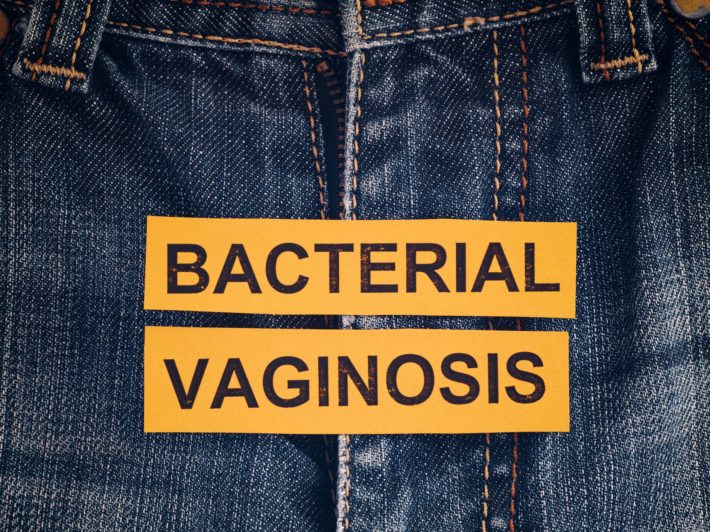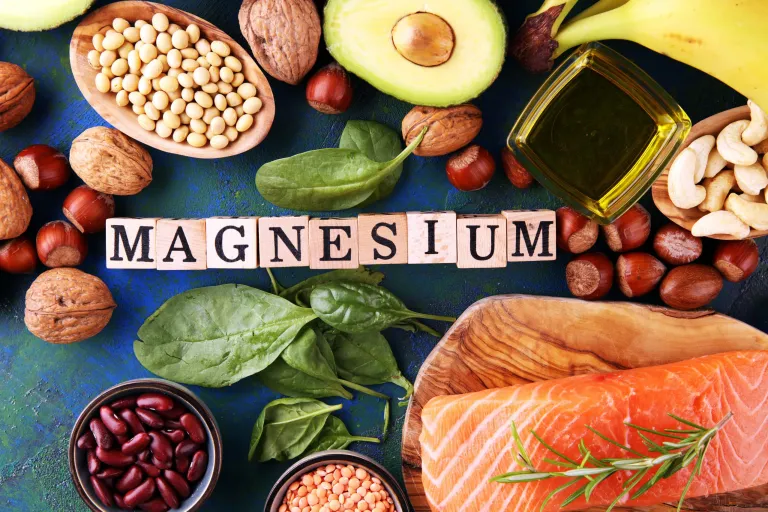|
by Ashley Jordan Ferira, PhD, RDN
Recent research from three well-known cohorts, The Nurses’ Health Study (NHS), NHS2 and Health Professionals’ Follow-Up Study (HPFS), reveals that higher magnesium intake is associated with lower risk of type 2 diabetes (T2D), particularly in diets with poor carbohydrate quality.1 Green leafy vegetables, unrefined whole grains, and nuts are richest in magnesium, while meats and milk contain a moderate amount.2 Refined foods, like carbohydrates (carb), are poor sources of magnesium. Diets with poor carb quality are characterized by higher glycemic index (GI), higher glycemic load (GL), and lower fiber intake. These poor carbs require a higher insulin demand. The typical American diet is low in vegetables and whole grains, resulting in reduced magnesium intake. The Recommended Daily Allowance (RDA) for magnesium is 310-320 mg/day for adult women and 400-420 mg/day for adult men.3 Half of the US population fails to meet their daily magnesium needs, and hypomagnesemia exists in 1/3 of adults.4-5 Magnesium is needed for normal insulin signaling; current research has linked insufficient magnesium intake to prediabetes, insulin resistance and T2D.4 Increased magnesium intake has been inversely associated with T2D risk in observational studies.6 Collaborators from Tufts University, Harvard University, and Brigham and Women’s Hospital, sought to investigate the impact of magnesium intake, from both dietary and supplemental sources, on the risk of developing T2D in subjects who had diets with poor carb quality and raised GI, GL, or low fiber intake.1 They followed three large prospective cohorts, NHS, NHS2 and HPFS (totaling over 202,700 participants). Dietary intake was quantified by validated food frequency questionnaires (FFQ) every 4 years, and T2D cases were captured via questionnaires. Over 28 years of follow-up, there were 17,130 cases of T2D. Major study findings included:1
Similar to the US population estimates, 40-50% of study participants had inadequate magnesium intake. A healthful, varied diet and supplemental magnesium (especially in diets that restrict or exclude carbohydrates, dairy or meat) are essential to ensure sufficient daily magnesium intake. Why is this Clinically Relevant?
Citations
0 Comments
Urinary Tract Infections (UTIs) aren't just a health inconvenience; they're a global epidemic, affecting millions worldwide, with Africa bearing a particularly heavy burden of 150 million cases annually. However, amidst this alarming statistic, there's a glimmer of hope: the potential of natural solutions in tackling this pervasive issue.
The UTI Epidemic: UTIs, primarily instigated by the bacterium E. coli, pose a significant health challenge, especially for women, with half experiencing at least one UTI in their lifetime. The recurring nature of UTIs complicates treatment, often rendering conventional approaches inadequate. Harnessing Nature's Arsenal: Natural ingredients offer promising avenues in UTI management: D-Mannose: A naturally occurring monosaccharide, D-mannose emerges as a formidable weapon against UTIs. Its mechanism involves binding to E. coli bacteria, impeding their attachment to bladder walls, and facilitating their expulsion via urine. Studies highlight its superiority over antibiotics in preventing recurrent UTIs. Cranberry: Famed for its anti-adhesion properties, cranberry contains proanthocyanidins that deter E. coli attachment to urinary epithelial cells, thus diminishing infection risk. Moreover, cranberry's proanthocyanidins disrupt biofilm formation, further hindering bacterial colonization. Quercetin: This potent flavonoid boasts antioxidant and anti-inflammatory prowess, making it a valuable ally in UTI combat. Its antibacterial action, particularly against E. coli, coupled with biofilm inhibition, enhances efficacy in UTI management. Vitamin C: Beyond bolstering the immune system, vitamin C wields antibacterial effects, bolstering the body's defense against UTIs. 2’-Fucosyllactose: Derived from human milk, 2’-Fucosyllactose acts as a decoy for pathogens, thwarting their colonization and adhesion to epithelial cells in the gut—a pivotal aspect of UTI prevention. The Proof in Research: Pilot studies featuring women with UTIs showcase significant symptom and quality of life enhancements with D-mannose supplementation. Combining D-mannose and cranberry with antibiotics elevates cure rates by a remarkable 53%, underscoring the ingredients' synergistic effects. Comparative investigations between D-mannose and antibiotics for recurrent UTI prevention highlight D-mannose's superiority, offering renewed hope to recurrent infection sufferers. In Conclusion: Despite the daunting prevalence of UTIs, natural remedies offer a beacon of hope. By harnessing the potency of nature's arsenal, UTI management transcends conventional limitations. Bid adieu to UTI discomfort and embrace a journey toward wellness with nature's nurturing touch—a journey powered by D-mannose, cranberry, quercetin, vitamin C, and 2’-Fucosyllactose. References:
by Bianca Garilli, ND
For women, the pre- and post-menopausal years represent a time of major change in many aspects of life including spiritual, emotional, and physical. From a physical perspective, shifting levels of sex hormones such as dehydroepiandrosterone (DHEA), testosterone, and estrogen play critical roles in the transition in and through menopause. It’s during this chapter of a woman’s life that the number of ovarian follicles begin to decline. Their eventual depletion cause the ovaries to no longer respond to FSH and LH from the pituitary, resulting in cessation of estrogen and progesterone production from the ovaries.1 Declining estrogen levels typically begin several years before the final menstrual period (FMP)- which is defined as the cessation of the menstrual period for at least 1 year- and stabilize around two years after the FMP.2 In a similar fashion, testosterone levels change in women during the menopausal timeframe, although this sex hormone does not seem to experience as dramatic of a decline as estrogen. Frequently this results in a higher ratio of testosterone to estrogen in the post-menopausal timeframe.3 This higher testosterone level as compared to estrogen level has been associated with higher risk factors for cardiovascular disease (CVD) in women, although the impact on incident events of CVD, coronary heart disease (CHD), and heart failure (HF) in response to this sex hormone ratio is less clear.4 A study published in the Journal of the American College of Cardiology studied 2,834 post-menopausal women from the Multi-Ethnic Study of Atherosclerosis (MESA) cohort, with a mean age of 64.9 years and without CVD at baseline.4 Levels of testosterone, estradiol, DHEA, and sex hormone-binding globulin (SHBG) were assessed at the beginning of the study; participants were followed for an average of 12.1 years.4 Levels of sex hormones were evaluated for association with incident CVD, CHD, and HF. Adjustments were made for relevant variables including demographics, CVD risk factors, and hormone therapy use.4 The study found no associations between DHEA nor SHBG levels with incident CVD, CHD, and HF outcomes.4 However, an elevated risk for incident CVD, CHD, and HF events was found to be associated with a higher testosterone/estradiol ratio, with higher testosterone levels associated with higher CVD and CHD.4 Conversely, higher estradiol levels were associated with a lower CHD risk, leading the authors of this study to conclude that “sex hormone levels after menopause are associated with women’s increased CVD risk later in life”.4 Why is this Clinically Relevant?
View the abstract Citations
Exploring key factors associated with sleep disturbances during perimenopause by Bianca Garilli, ND
The demarcations of a woman’s physiological stages of life are often delineated by the various, unique phases and cycles associated with fertility, reproduction, and the hormones at work behind the scenes. These stages include:1
For many women, after many years of sleep deprivation during the child-bearing and rearing years, a good night’s rest is welcomed. Unfortunately, perimenopause, which typically begins sometime in a woman’s mid-to-late 40s and can last anywhere from 2-10 years, may create a whole new set of sleep challenges.2,3 Prevalence of sleep problems during perimenopause Compared to men, sleep complaints are approximately twice as prevalent in women of all ages, with a prevalence during perimenopause ranging from 39-47%, underscoring the importance of investigating sleep problems in a female-centric way.3 To this end, sleep duration and quality of a nationally representative sample of women 40-59 years of age were studied by the CDC and broken down categorically by menstrual cycle/menopausal phase; sleep data during the perimenopausal phase revealed that:4
Hormones are at play Sex hormones So what is happening during perimenopause that so dramatically and negatively impacts sleep patterns? For starters, the decline in levels of sex hormones (in particular estrogen, progesterone, and testosterone) during the perimenopausal years lead to an array of symptoms, most of which can adversely affect sleep habits. These include: hot flashes, migraines, sleep apnea, circadian rhythm abnormalities, restless legs syndrome, lifestyle factors, as well as mood disturbances such as anxiety.2,4,5 Interestingly, in an analysis reviewing sleep concerns in various stages of menses/menopause, it was found that vasomotor symptoms (hot flashes) and sleep disturbances may work bidirectionally.6 In other words, hot flashes may increase difficulties obtaining appropriate duration and quality of sleep, while sleep problems may worsen vasomotor symptoms,6 a circuitous “what came first?- chicken or egg,” kind of hormonal dance. The types of sleep disturbances most often noted by perimenopausal women include difficulties with initiating and/or maintaining sleep, as well as frequent nocturnal and/or early morning awakenings.5 It’s well known that during perimenopause, estrogen levels drop sharply, corresponding to many of the symptoms associated with this transition period. However, less well known is another hormone whose levels decline and no doubt, play a key role in sleep dysfunction. That hormone is melatonin, which decreases during perimenopause, although the decline in melatonin is more gradual than that of estrogen.7 Melatonin Melatonin secretion from the pineal gland drops as individuals hit their mid-life years, coinciding with the perimenopausal phase in women.7 An article published in the Journal of Sleep Disorders and Therapy indicates that exogenous use of melatonin may improve some of these sleep challenges, including the nocturnal awakenings observed during perimenopause.5 Further research indicates that the use of slow-release melatonin preparations increase total sleep time and sleep efficiency, as well as reducing sleep latency in patients with insomnia.5 Interestingly, melatonin may also play a role in the modulation of many symptoms and conditions associated with menopause, including reduction in bone density, mood disorders, fibromyalgia, and potentially even neurodegenerative diseases.7 Assuredly, much more research is needed in the area of sleep disorders, perimenopause, and related hormonal fluctuations. Sociodemographic factors Sociodemographic variables can also contribute to perimenopausal sleep disturbances:
Women who are experiencing sleep concerns should work with a healthcare practitioner trained to 1) take a deep dive into the various aspects of lifestyle that may be affecting sleep health and 2) identify and address any deleterious health consequences from inadequate sleep. These areas should encompass the full spectrum of her individual health and wellness, from a focused cardiovascular and metabolic exam, to an in-depth look into the social and emotional aspects of her life. Each of these areas is important to consider and address to effectively and safely treat sleep challenges during the perimenopausal years and beyond. Citations
Alternative and Emerging Treatments Angela Kelly, MA and Michael Stanclift, ND
This is the last installment of a three-part series on bacterial vaginosis (BV). In part one, we discussed a healthy vaginal microbiome, symptoms, and diagnostic criteria. In part two , we highlighted the risk factors that contribute to BV, the health impacts it can cause, and conventional antimicrobial treatments, along with their propensity for resistance. As we saw in part two , conventional antimicrobials often only temporarily resolve BV, and contribute to antibiotic resistance. For this reason, many patients turn to alternative treatments. In addition, new therapeutics are appearing and some show great promise. It is important to note that treatments such as boric acid, prebiotics, garlic, vaginal microbiome transplantation, Zataria Multiflora cream, vitamin C, antiseptics, and seaweed extracts have limited clinical data to support their use. However, multiple clinical trials can be found supporting the use of probiotics for the treatment of BV. Boric acid Though toxic if taken orally, boric acid administered intravaginally has been used to treat vaginal infections for over 100 years.1 It can lower the rate of BV recurrences when used as a complementary therapy to antimicrobials.2 A recent study shows the potential for boric acid as a standalone treatment for BV.3 Side effects are uncommon (< 10% of cases) but include watery discharge during treatment, vaginal burning sensations, and vaginal erythema.4 Prebiotics Prebiotics feed beneficial microorganisms. In a randomized double-blind study from 2012, a prebiotic gel containing prebiotics from the glucooligosaccharides (GOS) family was shown to quickly restore the vaginal microbiota.5 Additionally a clinical study from 2017 showed that prebiotic gels may also improve the success of BV treatments.6 Garlic A 2013 study comparing garlic tablets to oral metronidazole found that garlic tablets were as effective as metronidazole with far fewer reported side effects.7 Side effects of garlic tablets were more tolerable than metronidazole and included heartburn and nausea.7 Vaginal microbiome transplantation Vaginal microbiome transplantation (VMT) involves seeding a recipient’s vaginal microbiome with the bacteria from a healthy donor. A 2019 study of VMT successfully treated four out of five participants with intractable and recurrent BV.8 In some cases, multiple VMT treatments may be necessary.8 Zataria multiflora cream Also known as Shirazian thyme, Zataria multiflora is a plant native to Iran, Afghanistan, and Pakistan. The plant’s essential oil contains thymol and carvacrol, which have antibacterial properties.9 A 2008 clinical trial revealed Zataria multiflora vaginal cream to be as effective in treating BV as metronidazole vaginal cream.9 Adverse side effects of treatment included nausea, vaginal dryness, and burning. Vitamin C In a 2011 clinical trial it was shown that when administered intravaginally, silicon-coated vitamin C tablets were as effective as metronidazole gel in treating BV and were beneficial in preventing recurrences.10 However, not all participants were able to tolerate treatment due to itching, burning, and pain.10 Antiseptics In a study of patients with recurrent BV, Octenidine showed high initial cure rates over 87%; however, the development of bacterial resistance to Octenidine was very high with 37.5% of patients showing complete resistance at three treatments/one-year follow-ups.11 At six months the relapse rate of patients included in this study were as high as 66.6%.11 Seaweed extracts Preclinical research found that ethanol extract of green seaweed (U. Pertusa) possesses robust antimicrobial activity against G. vaginalis, which may have potential as a future treatment for BV.12 Probiotics: Lactobacillus reuteri RC-14 and Lactobaciullus rhamnosus GR-1 Probiotics are “live microorganisms which when administered in adequate amounts confer a health benefit on the host.”13 Currently, probiotics are not recommended as a standalone treatment for BV. However, supplementation with probiotics appears to be beneficial in managing BV, regardless of concurrent antimicrobial treatment.14 Probiotics are a promising complementary therapy to antimicrobials for the treatment of BV.15-20 Studies have shown that when taken orally, lactobacillus probiotics are safe and can improve the vaginal microbiota.16,21 Lactobacillus reuteri RC-14, which was first isolated from a healthy woman’s urogenital tract, can displace G. vaginalis biofilms in vitro.22Studies combining L. reuteri RC-14 and L. rhamnosus GR-1 show success in colonizing and rebalancing the vaginal microflora.16,21,23 Women treated with a combination of metronidazole, L. rhamnosus GR-1, and L. reuteri RC-14 were more than twice as likely to achieve cure than withantimicrobials alone (88% vs. 40%).15 Another study showed using tinidazole for treating BV was improved when combined with L. rhamnosus GR-1 and L. reuteri RC-14.24 In that study, researchers showed an 87.5% cure rate in probiotic group vs. 50% cure rate in the antibiotic/placebo group.24 A randomized, double-blind, placebo-controlled trial (RCT) in postmenopausal women with L. rhamnosus GR-1 and L. reuteri RC-14 as a standalone preventative therapy resulted in a shift from “indeterminate” to “normal” vaginal microbiota in 60% of the women in the probiotic group vs. 16% of women in the control group.25 Another RCT revealed that L. rhamnosus GR-1 and L. reuteri RC-14 may prevent BV infections in women with HIV.26 So how do these probiotics, which are taken orally, work to help the vaginal microbiome? L. rhamnosus GR-1 and L. reuteri RC-14 can colonize the vagina from the intestinal tract via the perineum.16,27 Lactobacilli weaken biofilms by producing lactic acid, hydrogen peroxide, bacteriocins, and antiadhesive biosurfactants.20 Biosurfactants produced by L. rhamnosus GR-1 and L. reuteri RC-14 work to disrupt the biofilms created by Gardnerella and residing multispecies anaerobes.20 This disruption allows probiotic strains to displace/crowd out pathogenic bacteria.20 L. rhamnosus GR-1 may also positively impact mucosal immunity, allowing the host to defend against pathogenic bacteria through colonization of the gut or vagina or both.16 With the low long-term cure rate of antibiotics in treating BV and the growing threat of antibiotic resistance, the use of probiotics in treating BV should continue to be explored further. Final thoughts BV infections can result in devastating physical, reproductive, and emotional health consequences for women and their partners. The high rate of recurrence underlines the need to improve the current standard of care. Finding personalized, effective, long-term solutions to BV requires ingenuity and tenacity. Emerging BV treatments offer clinicians better solutions to help patients stop the revolving door of BV. Liberating women from a cycle of recurring BV is well worth the endeavor. Citations
BV Risk Factors, Health Impacts, Current Antimicrobial Therapeutics, and Resistance Angela Kelly, MA and Michael Stanclift, ND
This is part two in a three-part series about bacterial vaginosis (BV). In part one we discussed a healthy vaginal microbiome, BV’s characteristics, and diagnostic criteria. In this section, we’ll explore risk factors for developing BV, the health impacts of it, and current conventional therapies. BV risk factors While the precise causes of BV are still being investigated, researchers have discovered the following risk factors that can contribute to its development:
Health impact of BV Although most cases of BV are asymptomatic, BV can still have devastating health consequences. Even without symptoms, BV can cause:
Current antimicrobial therapeutics and resistance Current antimicrobial therapeutics often provide only temporary relief and ultimately contribute to antibiotic resistance. BV is usually treated with metronidazole, clindamycin, or a combination of oral and intravaginal antibiotic therapies.49Occasionally other antibiotics such as rifaximin, secnidazole, and tinidazole are prescribed.49-51 A 2020 in vitro study showed clindamycin had greater initial effectiveness against G. vaginalis than metronidazole; however, clindamycin is strongly associated with antibiotic resistance.52-53 In a randomized clinical trial 17% of cases had baseline clindamycin resistance, and 53% showed resistance to it after therapy.53 Also of consideration, clindamycin has been linked to Clostridioides difficile (C. diff) colonization and pseudomembranous colitis.13,50,54 Studies demonstrate G. vaginalis and A. vaginae also show resistance to metronidazole, although to a lesser extent than clindamycin.52,55 When metronidazole is used to treat BV, it can break up the biofilm created by G. vaginalis and A. Vaginae; however, live cells can persist within the biofilm, allowing for recurrences.56 Microbial profiling shows metronidazole temporarily reduces vaginal microbial diversity, and the reestablished microbiota rarely returns to a balanced lactobacilli-dominant state.57 Treatment with metronidazole frequently causes the adverse effects of nausea, vomiting, GI disturbances, and metallic taste.54,58 Occasionally metronidazole may also cause seizures, peripheral neuropathy, transient neutropenia, and allergic reactions, including anaphylaxis.58 These findings highlight that effective and lasting treatments for BV are urgently needed. The pipeline of antibiotics continues to dwindle, and bacteria grow more resistant with the antibiotic treatment of each episode.59 The treatment of protracted or recurring cases of BV often results in a revolving door of relapses for patients.59 Identifying lasting treatments for BV that rely less on antibiotics is of the utmost urgency.60,61 BV recurrence after antimicrobials The recurrence rate following treatment of BV with antibiotics is high, with a study revealing that 58% of participants experienced a recurrence within a year and 69% returned to abnormal vaginal profiles.50,58 The high rate of recurrence appears to be multifaceted, linked to biofilms created by G. vaginalis and A. vaginae, impaired immune system response, antibiotic resistance, hygiene practices, and, according to some researchers, sexual transmission and reinfection by a woman’s sexual partner(s).60-63 Although there are variations in studies, a recent study showed improved BV recurrence rates when male partners were treated with oral and topical antibiotics. More research on the efficacy of treating sexual partners is needed.64 Having an untreated sexual partner is linked to a raised risk of recurrence of BV, although more research is needed.63,65 We can see the contributing factors for BV are multifactorial and that simple antimicrobial therapies are failing the majority of women they are prescribed to help. In our next and final installment in this series we’ll explore alternative and emerging treatments for BV, including the role of probiotics. We’ll see how a problem characterized by microbial overgrowth may ultimately need more microbes to see its resolution. Citations
The Vaginal Microbiome, BV Symptoms, and Diagnostic Criteria Angela Kelly, MA and Michael Stanclift, ND
In part one of this three-part series, we’ll discuss a healthy vaginal microbiome, symptoms, and the diagnostic criteria of bacterial vaginosis (BV). A healthy vaginal microbiome The vaginal microbiome is the lesser-known heroine of the body’s microbiomes and the first line of defense against pathogens that can cause infections.1-5 Like the gut microbiome, the vaginal microbiome is seeded from mother to daughter and the surrounding environment within 24 hours of birth.6-7Hormonal fluctuations related to puberty, the menstrual cycle, pregnancy, and menopause each contribute to the constantly changing landscape of the vaginal microbiome.8 During the reproductive years, the vaginal vault is populated by 90–95% lactobacilli in a balanced, healthy state. 9-10 Vaginal epithelial cells deposit glycogen, and the “friendly” lactobacilli ferment the polysaccharide, producing lactic acid.11 This fermentation process serves to lower vaginal pH, inhibit potentially harmful anaerobes’ growth, and discourage pathogens’ attachment to the vaginal epithelium.11 Additionally, lactobacilli produce antimicrobials such as hydrogen peroxide and bacteriocins, which deter biofilms and keep pathogenic anaerobes dormant.11 But what happens when the bacterial balance of the vagina is thrown out of whack? Bacterial vaginosis characteristics Bacterial vaginosis (BV) is the often silent, sometimes maddening, and quite common vaginal microbiome dysbiosis that affects 29.2% of women of reproductive age in the United States.12 The dysbiosis of BV is characterized by decreased “friendly” lactobacilli and an overgrowth of potentially pathogenic bacteria that may multiply to 1,000-10,000 times normal levels.13 Many studies suggest asymptomatic BV poses serious threats to reproductive and urogenital health and increases the risk of contracting and transmitting STIs.9,14-15 While the exact cause of BV is still under debate, the initial disruption of the vaginal microbiome is likely due to sexual transmission.16-17 Although with significantly lower frequency, females who have never been sexually active can also develop BV.18 BV is found globally, with higher incidences in certain countries and ethnicities.9 In the United States, Black and Mexican-American women are more likely to be affected by BV.9,19-20 Despite being the most common vaginal dysbiosis, women’s awareness of BV prior to their first infection is very low.21 Symptoms of bacterial vaginosis and diagnostic criteria While most BV cases occur asymptomatically, the CDC describes the following common symptoms that may occur:12,22
BV can be diagnosed using Amsel’s criteria or the Nugent scoring system. Amsel’s criteria for the diagnosis of BV are met when 3 out of 4 of the following clinical signs are present:23
Alternatively, the Nugent scoring system can be used to diagnose BV using a Gram stain, microscope, and a 0-10 score based on the amounts of the following microorganisms seen per high-powered field:24
So now that we have some of the basic background knowledge of the vaginal microbiome and how to detect BV in our patients, part two of this series will look at causes and risk factors, health impacts, and current conventional therapies for BV. In part three, we’ll look at alternative and emerging treatments, the role of probiotics, and discuss the mechanisms behind these approaches. Citations
A growing to-do list, meetings that drag into the late evening, financial strains, relationship issues, trouble sleeping: When it comes to stress, many men struggle to find an outlet. Yet, without the right coping mechanisms, chronic stress can deeply, and adversely, affect men’s health.1
How can men reduce the stress in their lives? No matter the source, chronic stress has significant effects on the body. Studies have linked it to a variety of health issues involving mood, sleep, appetite, and more.1 And while researchers have yet to pinpoint the specific ways long-term stress affects the heart, and other systems, men under seemingly constant pressure are also more likely to eat unhealthy foods, adopt a sedentary lifestyle, and smoke.2 Fortunately, men don’t have to let stress get the better of them. There are a number of strategies men can leverage to take charge of their wellbeing. Here are three stress-busting tips men should know about: Exercise on a near-daily basis
Improve diet and consider supplementation
Accordingly, we suggest that men look into the following dietary supplements:
Change the things that can be changed (and accept those that cannot be changed)
References
By Michael Stanclift, ND
We can deal with stress in many ways. My colleagues and I use a variety of lifestyle techniques and herbs to help patients manage their stress, but today I want to share some of my “go-tos” and why they are among my favorites. When it comes to ease of use, minimal side effects, and fast results, I like to use magnesium, vitamin B6, and green tea for my patients with occasional stress, and here’s why. Magnesium is a surprisingly common deficiency, and the symptoms of magnesium deficiency overlap with stress.1 Feeling nervous, fatigued, irritable, weak, tense muscles, upset stomach, and/or headaches? That’s possibly a magnesium deficiency.1 What’s interesting about magnesium is that being stressed over a long period can deplete it, so it becomes a downward spiral.1 Magnesium is important for our body to make and use serotonin, that neurotransmitter that’s associated with feeling content and happy.1 Magnesium also has actions involving GABA, a calming neurotransmitter—lots of other substances (such as alcohol) act on GABA receptors in our brain.1 I haven’t ever seen anyone’s judgment seriously impaired by taking magnesium, but in some people, at the right dose (myself included) they appeared to have that happy one-drink kind of buzz… Not bad for a mineral. Supplementing magnesium can decrease cortisol levels, improve heart rate variability (a measure of how well you “rest and digest”), and in one study provided up to 45% relief from stress from those with the highest baseline levels.1 Next, let’s meet magnesium’s buddy, vitamin B6. I call vitamin B6 magnesium’s buddy because it helps magnesium get into our cells.2 In fact, adding B6 to magnesium for stress relief can improve the effect by up to 24% compared to magnesium alone.2 B6 is also important for stress relief because it’s involved in our brain’s ability to make neurotransmitters that influence our moods like serotonin, norepinephrine (noradrenalin), dopamine, and GABA.3 A very simplified view of these neurotransmitters is to say serotonin is associated with satisfaction; norepinephrine is about excitement; dopamine relates to motivation, rewards, and movement; and GABA is related to feelings of relaxation. So it follows that vitamin B6’s being involved with these neurotransmitters would have an impact on our moods. In fact, a study of women over 40 years old in Japan revealed those with low vitamin B6 intake reported significantly worse moods than those getting higher B6 levels.4 Lastly, I really like using green tea to help with stress. I drink it regularly, even use it in supplement form, and have turned many patients onto it. Green tea can help with stress because it can take the place of another caffeinated drink, such as coffee. Because it has some caffeine, it can provide that energy boost we’re looking for, but the other components in green tea bring along benefits as well. Green tea is famous for also having the hard-to-pronounce epigallocatechin-3 gallate (EGCG) and l-theanine. EGCG is a fantastic and versatile antioxidant with a number of health benefits and can improve cognition and neuropsychology.5 EGCG has calming effects and can increase relaxing (alpha/beta) and focused (theta) brain waves.5 L-theanine, an amino acid found in high amounts in green tea, can reduce the spike in blood pressure seen from stress.5 A randomized placebo-controlled trial giving pure l-theanine to healthy middle-aged participants showed improvements in sleep measures and verbal fluency, a psychological test that challenges multiple functions of our brains.6 A study comparing standard and reduced-caffeine green tea found the reduced-caffeine version produced greater stress reduction and better sleep quality—no real surprise for regular caffeine drinkers.7 Although there are a number of tools I have used with patients to help with stress, these are my favourite “first lines” to use because they’re gentle yet powerful, patients tolerate them well, they tend to work quickly, and patients can stay on them long-term, if needed. Also, these have pretty wide dosage windows, meaning we can dial in the dose for the patient and the situation. Sensitive folks can take low doses, and others can take four times as much and still tolerate it well, without impairments or losing their mental sharpness. Magnesium, B6, and green tea can be used separately, but I often use them in combination for the best results. References:
By Malisa M. Carullo, BSc, MSc, ND
Magnesium is one of the top five most abundant minerals in the human body.1-3 There are hundreds of biochemical reactions that require this mighty mineral.1-3 Without magnesium present, organs such as the heart and muscles simply shut down.1-3 How much magnesium do we need? According to the National Institute of Health (NIH), males between 31 and 50 years of age should have 420 mg per day of magnesium.1-3 Women in the same age group should receive 360 mg daily.1-3 Around 48% of the US population does not meet the recommended intake levels of this important mineral, and that percentage is even higher for men over the age of 71 and adolescent women.2,4 How can we get magnesium? Foods rich in magnesium include dark green leafy vegetables, whole grains, and legumes, but the body only absorbs around 30% to 40% of magnesium from foods.2 When you consider that lifestyle factors can also negatively impact absorption, it is not a surprise that many prefer to supplement the mineral. Magnesium absorption seems to decrease with age, varies with dietary protein intake, and can even be affected in those with gastrointestinal disorders.1-3 Including a magnesium supplement in your diet may be one approach to make sure you are getting enough of this essential mineral; however, choosing the best form for you may be a challenge. Here is a brief overview of the most common forms of magnesium available for supplementation. Magnesium bis-glycinate is one of the most highly bioavailable forms, meaning it is well absorbed into the bloodstream.5 This form of magnesium is special in that it is attached to an amino acid, glycine. Glycine is known to exert a calming effect on the nervous system which makes this form of magnesium recommended in instances where sleep disturbances, muscle spasms, or high stress are present.1,3,5-7 Magnesium citrate has been the form of choice for many individuals for quite some time, most likely because it has been shown to improve clinical outcomes for many health conditions. This form of magnesium is attached to citric acid, which is typically well absorbed into the bloodstream and has the ability to relax musculature and improve one’s stress response.1,3,7,8 Since magnesium citrate is effective at delivering high amounts of magnesium within a short period of time, it is recommended for those who experience occasional constipation. It can also be helpful if dosed before bed for the same reason to support those that may have difficulty sleeping.1,3,7,8 Magnesium L-threonate is the newest form available and is the only form that has the ability to reach the brain.9 With that being said, this form is best utilized when cognitive support is needed, mental relaxation, or to improve concentration.1,3,9,10 Magnesium oxide is a form that is commonly used in supplements because the size of this compound is very small. When compounds are smaller in size, large amounts can be packaged in capsules or tablets without occupying much space. Although the size may be desirable for use in supplement formulas, this form is a poor source of magnesium and has been known to cause undesirable digestive symptoms such as loose stools and intestinal cramping when taken at high doses.1,3,5,7 Magnesium malate is a form that is chosen for use in any health conditions where cellular energy needs to be supported. Malic acid (from malate) supports energy production inside cells so individuals who suffer from sore muscles, muscle pain, or body discomfort may experience relief from the use of this form.1,3,7 There are magnesium supplement options that will fit any lifestyle. Speak to your healthcare practitioner today to discover which magnesium option is right for you. References
|
Categories
All
Archives
April 2024
|
|
Join Our Community
|
|
Amipro Disclaimer:
Certain persons, considered experts, may disagree with one or more of the foregoing statements, but the same are deemed, nevertheless, to be based on sound and reliable authority. No such statements shall be construed as a claim or representation as to Metagenics products, that they are offered for the diagnosis, cure, mitigation, treatment or prevention of any disease. |












 RSS Feed
RSS Feed